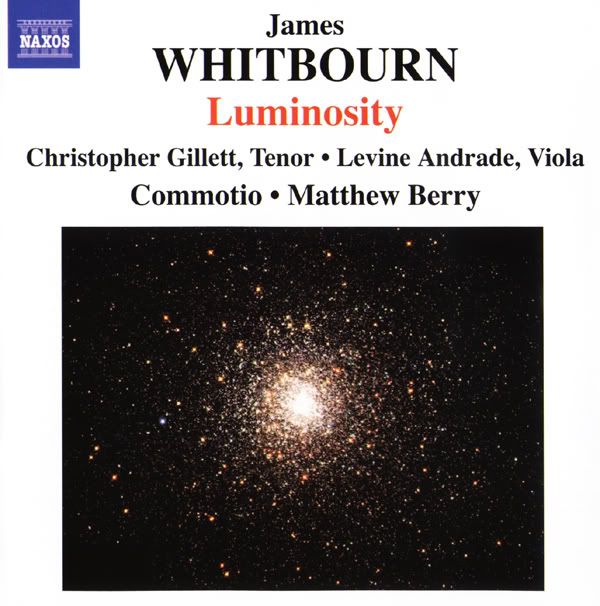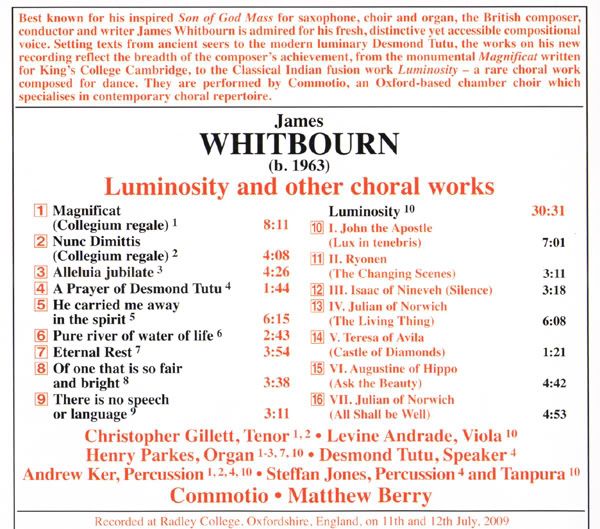 |
| NetLab · Rules · Torrent Tracker · Have a problem? · Eng/Rus |
 Help Help
 Search Search
 Members Members
 Gallery Gallery
 Calendar Calendar
|
| Welcome Guest ( Log In | Register | Validation ) | Resend Validation Email |
|
Posted: 07-09-2012, 21:16
(post 1, #1060648)
|
||||||||||||||||||
|
Pro Member Group: Members Posts: 695 Warn:0% |
James Whitbourn (b. 1963) Luminosity and other choral works Label: Naxos, 8.572103 Year: 2010 Performers: Christopher Gillett - tenor Levine Andrade - viola Henry Parkes - organ Commotio Matthew Berry - conductor Tracklist: Magnificat and Nunc Dimittis, ''Collegium Regale'' 01. Magnificat 02. Nunc Dimittis 03. Alleluia jubilate 04. A Prayer of Desmond Tutu 05. He carried me away in the spirit 06. Pure river of water of life 07. Eternal Rest 08. Of one that is so fair and bright 09. Annelies: There is no speech or language Luminosity 10. I. Lux in tenebris 11. II. The Changing Scenes 12. III. Silence 13. IV. The Living Thing 14. V. Castle of Diamonds 15. VI. Ask the Beauty 16. VII. All Shall be Well Total Playing Time: 01:08:44 Best known for his inspired Son of God Mass for saxophone, choir and organ, the British composer, conductor and writer James Whitbourn is admired for his fresh, distinctive yet accessible compositional voice. Setting texts from ancient seers to the modern luminary Desmond Tutu, the works on his new recording reflect the breadth of the composer’s achievement, from the monumental Magnificat written for King’s College Cambridge, to the Classical Indian fusion work Luminosity-a rare choral work composed for dance. They are performed by Commotio, an Oxford-based chamber choir which specialises in contemporary choral repertoire. James Whitbourn has a growing reputation as a composer, conductor and producer of broadcasts. An earlier disc devoted to his choral music was warmly received by Grace Lace, though I have not heard it. On the evidence of this new disc I am keen to remedy that omission. The most substantial offering here is Luminosity, a work in seven movements, conceived for choir and dancers. In a staged performance there is also the opportunity to use lighting further to stimulate the imagination and response of the audience though here we must rely solely on the auditory aspect of the work. The scoring is novel. The accompaniment features a solo viola obbligato, played here most skilfully and persuasively by Levine Andrade, one of the founder members of the Arditti Quartet. The other instruments involved are organ, percussion and the tanpura, an Indian instrument that produces a drone-like sound. The texts selected by Whitbourn are by a number of mystic writers, including St. John the Evangelist, St. Teresa of Avila and St. Augustine. Whitbourn uses the forces at his disposal to create some most imaginative and often subtle sonorities and textures – the way the husky tones of the viola are employed is most evocative. There’s some most effective writing for the choir and the Indian overtones are not used to excess so that when they feature in the musical palette the effect generated thereby is all the stronger. The rapt concluding movement is particularly beautiful but the whole score is impressive and eloquent and its appearance on disc is most welcome. The ‘Mag’ and ‘Nunc’ were written for King’s College, Cambridge and first performed there on Easter Sunday, 2005. The music is impressive and often dramatic, especially in the Magnificat. There are some passages of great power, such as at the doxology of the Magnificat and at the words ‘to be a light to lighten the Gentiles’ in the Nunc Dimittis. There are also some very poetic stretches, especially at the beginning and end of the second canticle. The only slight reservation I have is to wonder in passing how frequently the canticles will be performed. The tam-tam part, though optional, seems to me to be very important and many church choirs won’t have access to such an instrument. That part may be optional but the tenor solo role is absolutely integral. It sounds very demanding, requiring a soloist of the stature of Christopher Gillett to do it justice – Gillett is excellent, by the way. I hope these impressive canticles won’t languish unperformed, save on Big Occasions, simply because the writing is too ambitious. The smaller-scale pieces give much pleasure. It’s good to hear the distinctive voice of Archbishop Tutu himself reading his own words, even if his contribution is brief. Eternal Rest was written to a BBC commission for the broadcast of the funeral of Queen Elizabeth the Queen Mother. The music was originally conceived for orchestra – and it’s not clear from the notes, parts of which could have been more expressed with greater clarity, whether it was the orchestral version that was used for the funeral broadcast. If the choral version, with organ accompaniment, is a later inspiration then it seems to me to work very well. Of one that is so fair and bright uses, I think, the same text that Britten uses for his A Hymn to the Virgin. I can’t be sure since this is one of the texts not reproduced in the booklet. Whitbourn’s setting, for unaccompanied voices, is a good one. The music on this disc reveals a composer with a fine ear for vocal writing. The music sounds well conceived for the voices and the accompaniments are, without exception, effective and complement the singing very well. James Whitbourn has made a shrewd choice of texts for these pieces and it’s obvious that the words have inspired him. The performances seem to me to be very good and accurate – though I haven’t seen any scores. Commotio, a choir which I’ve not previously encountered, sings very well indeed and the instrumentalists match the excellence of the singers. I would imagine that Matthew Berry is fully convinced by the music since he inspires performances of great conviction. I’ve enjoyed this disc very much. James Whitbourn seems to be a choral composer of no mean accomplishment.  
This post has been edited by kgkk on 07-09-2012, 21:18 |
||||||||||||||||||
|
|||||||||||||||||||


Powered by Invision Power Board v1.3.1 Final.

